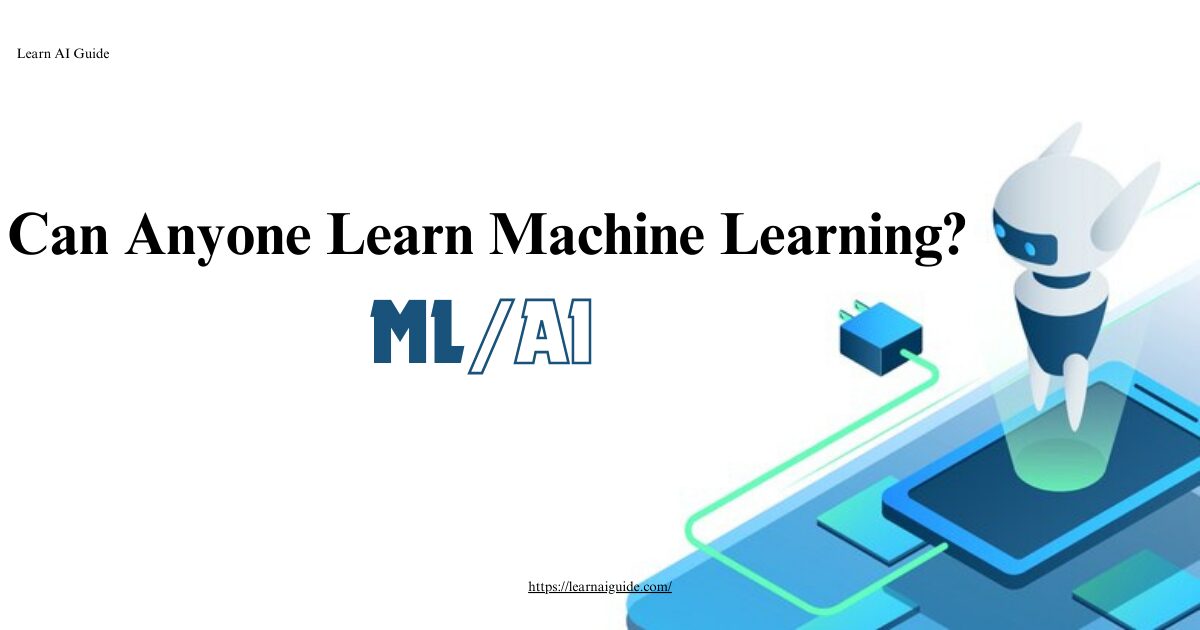Machine learning (ML) is an exciting field that has the potential to revolutionize various industries, from healthcare to finance. The rapid growth of ML applications has led many to ask, “Can anyone learn machine learning?”
The short answer is yes.
Regardless of your background, you can learn machine learning if you are willing to invest the time and effort. This article will explore how different people can approach learning ML and overcome common challenges.
Understanding Machine Learning
Machine learning is a subset of artificial intelligence (AI) that focuses on building systems that can learn from and make decisions based on data. It involves algorithms and statistical models to perform tasks without explicit instructions.
There are three main types of machine learning:
- Supervised learning,
- Unsupervised learning, and
- Reinforcement learning.
Supervised learning involves training a model on labeled data, unsupervised learning finds patterns in unlabeled data, and reinforcement learning uses a system of rewards and penalties to train models.
The Importance of Background Knowledge
Before diving into machine learning, it’s helpful to have a foundational understanding of certain subjects. Mathematics, particularly linear algebra, calculus, and statistics, is crucial. Programming skills are also necessary, with Python and R being the most common languages used in ML.
Additionally, familiarity with data handling and analysis will provide a significant advantage. However, you don’t need to be an expert in these areas to start learning ML. Many resources are designed for beginners and can help you build up your knowledge as you progress.
Accessible Learning Resources
Today, there are countless resources available to help you learn machine learning. Online courses and tutorials, such as those offered by Coursera, edX, and Udacity, provide structured learning paths. Books like “Hands-On Machine Learning with Scikit-Learn, Keras, and TensorFlow” offer comprehensive guides.
Community forums, such as Kaggle and Stack Overflow, provide support and allow you to connect with other learners. These resources make it possible to learn machine learning independently.
Learning Strategies for Different Backgrounds
Depending on your background, your approach to learning ML may vary. Students can integrate ML into their academic curriculum through relevant courses and projects. Professionals can leverage their existing knowledge and industry experience to understand ML applications relevant to their field.
Non-technical individuals can start with fundamental concepts and gradually build complexity, focusing on practical applications rather than theoretical details.
Overcoming Common Challenges
Learning machine learning can be challenging, especially when dealing with mathematical complexity and understanding algorithms. Staying motivated and consistent with your learning is crucial. Break down your learning into manageable steps, set realistic goals, and celebrate small achievements.
Practical projects can help solidify your understanding and keep you engaged. Remember, persistence is key, and it’s okay to seek help when needed.
Real-Life Success Stories
There are numerous examples of individuals from diverse backgrounds who have successfully learned machine learning. These stories highlight that it is possible to break into the field regardless of your starting point.
By sharing their journeys, these individuals provide valuable insights and advice that can inspire and guide you in your learning process.
Practical Steps to Get Started
To start learning machine learning, set up a learning plan and timeline that fits your schedule. Choose the right projects and datasets to work on, as practical experience is crucial. Building a portfolio to showcase your skills is also essential.
Include projects that demonstrate your ability to apply ML techniques to real-world problems. This portfolio can be a valuable asset when seeking job opportunities or further educational pursuits.
The Future of Learning Machine Learning
The future of learning ML is promising, with trends pointing towards more accessible and personalized education. AI-powered tools and platforms are making it easier for individuals to learn at their own pace.
These advancements are helping to democratize ML education, making it accessible to a broader audience. As technology continues to evolve, the barriers to learning ML will continue to decrease, making it an exciting field to get into.
Conclusion
Learning machine learning is an achievable goal for anyone willing to invest the time and effort. By leveraging the right resources and strategies, you can overcome common challenges and build a solid foundation in ML.
The inclusivity and accessibility of ML education are continually improving, making it possible for anyone to start their learning journey today.
Call to Action
If you have personal experiences or questions about learning machine learning, please share them in the comments. We would love to hear from you and provide support. Additionally, check out the recommended resources to begin your ML learning journey.
that’s all for today, For More: https://learnaiguide.com/understanding-machine-learning-algorithms-complete-guide/
